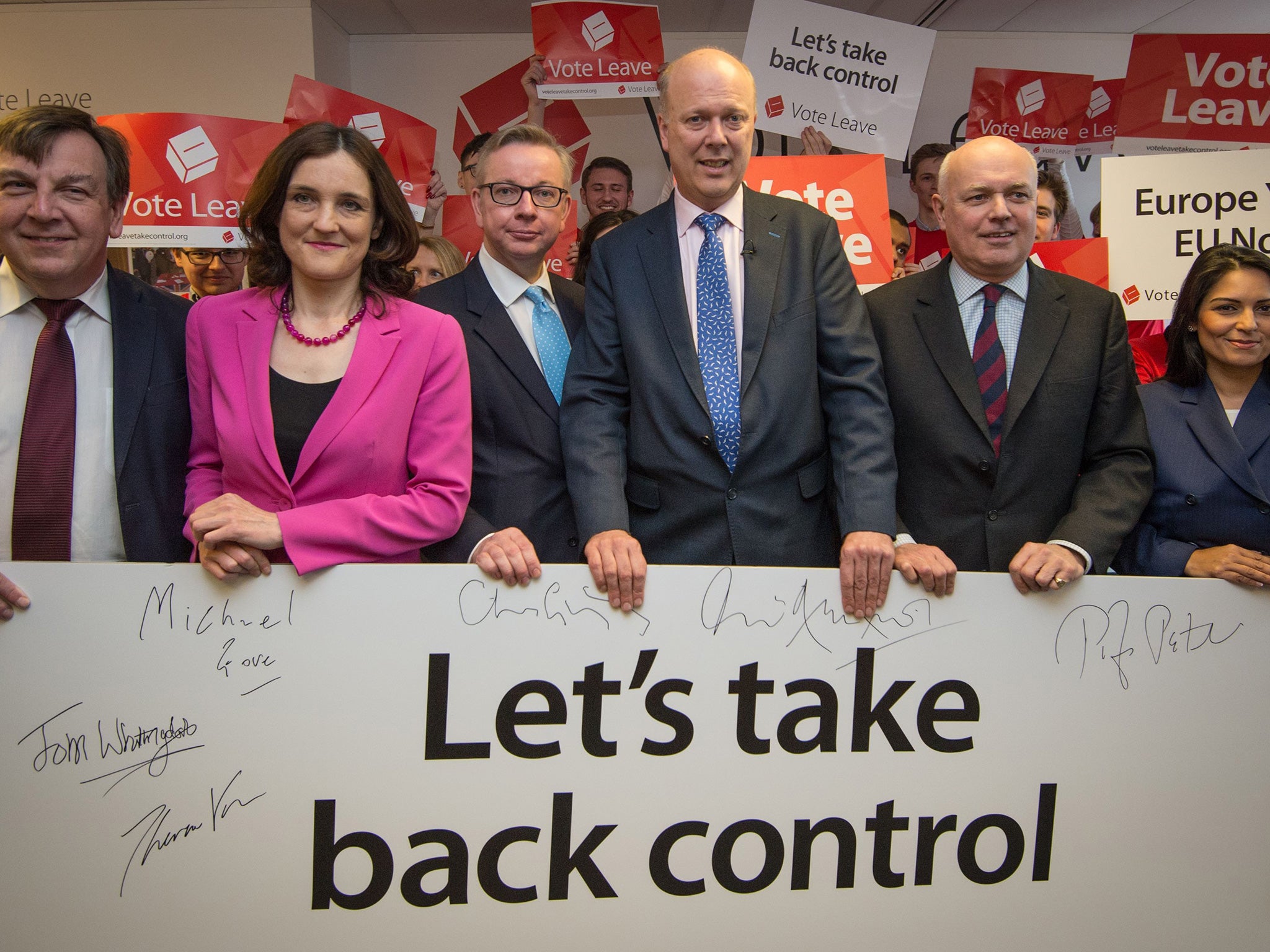EU Referendum: Chris Grayling to be first minister to share Vote Leave campaign platform with Nigel Farage
Mr Grayling also called for David Cameron to remain as Prime Minister in the event of Brexit

Britain would be “completely killed” in international trade negotiations if it votes to leave the EU, France’s economy minister has claimed.
Emmanuel Macron, who has previously warned that Brexit would see migrant camps move from Calais to Britain, said that the UK was currently a “strong” and “credible” trade partner with countries like China because of its EU membership and would risk international obscurity if it left.
“You will never be in a situation to negotiate face to face with China because your domestic market is not relevant for the Chinese in comparison with their domestic market,” he told the BBC’s Andrew Marr Show.
Pro-Brexit Cabinet minister Chris Grayling, who will today become the first Government minister to share a campaign platform with UKIP leader Nigel Farage, hit back at suggestions that Britain’s trading status would be diminished, claiming that millions of European jobs depended on British consumers.
However Mr Grayling also called for David Cameron to remain as Prime Minister in the event of Brexit – a sentiment that was echoed by fellow Conservative ‘Out’ campaigners David Davis and Northern Ireland Secretary Theresa Villiers.
The endorsements will be seen as an attempt to cool tensions in the Conservative party after Boris Johnson strongly criticised the Prime Minister, describing Mr Cameron’s claim that UK trade would suffer in the event of Brexit as “b******s”.
What's the European Parliament ever done for us?
Show all 5The London Mayor labelled Mr Cameron’s EU renegotiation deal “perfunctory” and criticised the Conservative’s three most powerful figures for failing to secure meaningful reform on EU immigration.
“We were told repeatedly in the run-up to this re-negotiation that we would be able to decide that only people who had jobs lined up could come here and we were just told to bog off and we got nowhere on that. It was Theresa [May], Dave [Cameron] and George [Osborne],” he said.
Divisions could open up again today with the expected publication of an official Treasury report outlining the economic costs and benefits of EU membership, which is expected to warn of a possible recession, rising prices and falling exports that could put many jobs at risk.
Mr Macron, seen as a potential candidate for next year’s French presidential elections, said that the UK should not isolate itself, suggesting that Brexit could see it reduced to the status of “Jersey or Guernsey”.
He repeated his assertion that a vote to leave could force France to reconsider its agreement with Britain, whereby UK border checks are carried out in French ports. He said there would be “big political pressures” from citizens of Northern France to reduce the strain on the region from migrants and refugees seeking to enter the UK.
“It’s obvious it will be extremely tough vis-à-vis out people especially [in the] north of France, to explain, ok, this guy decided to leave but we will keep everything like it was,” he said.
He also warned that Brexit would have “consequences” for the UK’s trade agreements with Europe, dismissing suggestions from some in the Out campaign that the UK could retain access to the single market, while dropping EU rules and regulations such as those guaranteeing freedom of movement.
“We have to be very clear that a Brexit will have consequences,” Mr Macron said. “Otherwise it is the beginning of dismantling. Every [EU state] which is, which disagrees on one or two points will decide to do the same. So you will have consequences.”
His comments reflect growing concern among EU leaders that Brexit would set off a chain reaction around the continent, encouraging other countries to seek their own new deal, and emboldening anti-EU movements – not least France’s far-right National Front, which has consistently secured second or first place in recent opinion polls. Whitehall officials are concerned that EU leaders’ fears of such a contagion will make the task of securing a good post-Brexit deal for the UK even more difficult.
The warning came as two pro-Brexit Cabinet ministers boosted David Cameron by saying that he should stay on as Prime Minister in the event of a vote to leave the EU.
Former Chancellor Ken Clarke had said last week that Mr Cameron “wouldn’t last 30 seconds if he lost the referendum”. But Mr Grayling, the House of Commons leader, told The Andrew Marr Show, that the Prime Minister had “the relationships around Europe” that would be needed to secure the UK the best post-Brexit deal.
"It would be disastrous, in my view, for the Leave cause if we vote to leave and then we get distracted by a Conservative leadership contest. He must stay, I want him to stay," he said.
Ms Villiers, the Northern Ireland Secretary, meanwhile told Sky News’s Murnaghan programme that it was “vitally important” Mr Cameron remained in office, calling him a “great Prime Minister”.
Subscribe to Independent Premium to bookmark this article
Want to bookmark your favourite articles and stories to read or reference later? Start your Independent Premium subscription today.

Join our commenting forum
Join thought-provoking conversations, follow other Independent readers and see their replies